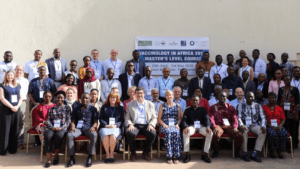Very few medical interventions compete with vaccines for their cumulative impact on global health. For this reason, the Jenner institute, University of Oxford and Pirbright started vaccinology courses in Africa, where global burden of vaccine preventable diseases is highest. This course alternates between African regions and previous courses have been held in Ghana, Kenya, Mali and Uganda, this year the 5th Vaccinology in Africa Masters level course took place in Gambia.
Conforming to ‘One Health’ agenda in this year’s course, exceptional academic and industrial speakers linked human and veterinary vaccinology, as well as the synergies between the two fields in a whole range of perspectives. Faculty members presented 36 very inspiring and highly informative talks about vaccine development, immunology, vaccinology technologies and vaccines.
Prof. Simon Draper (University of Oxford) gave a comprehensive review of malaria vaccine development with the first malaria vaccine RTS, S / AS01 entering phase IV trials in Malawi, Kenya and Ghana. Prof. Beate Kampman (MRC Unit Gambia/ LSHTM) talked about TB vaccinology. She also discussed maternal immunization, highlighting how passive immunity from immunized pregnant mothers can protect their new-borns in their first weeks of life. The course also discussed vaccines for many other diseases including HIV, HPV, meningitis, pneumonia, arboviral and enteric pathogens as well as veterinary vaccines.
Prof. Helen Fletcher (LSHTM), Prof. Sarah Gilbert (University of Oxford) and Dr. Ed Clarke (MRC Gambia/LSHTM) conducted workshops on vaccine design and undertaking field trials of new vaccines, emphasising the need for well informed and careful approaches at these very critical vaccine stages. Good understanding of desired vaccine immunology and primary and secondary endpoints of vaccine trials at different phases were among other issues discussed.
Dr. Baptiste Dungu (Onderstepoort Biological Products SOC Ltd, S.A), Dr. Amadou Sall (Institut Pasteur, Dakar) and others showcased great work in human and veterinary vaccine production in Africa. Highlighting that with commitment to making an impact and improving the health of its population, Africa has a great capacity and potential to see such a change through international collaborations and relevant training.
Article by Eunice Kiamba












